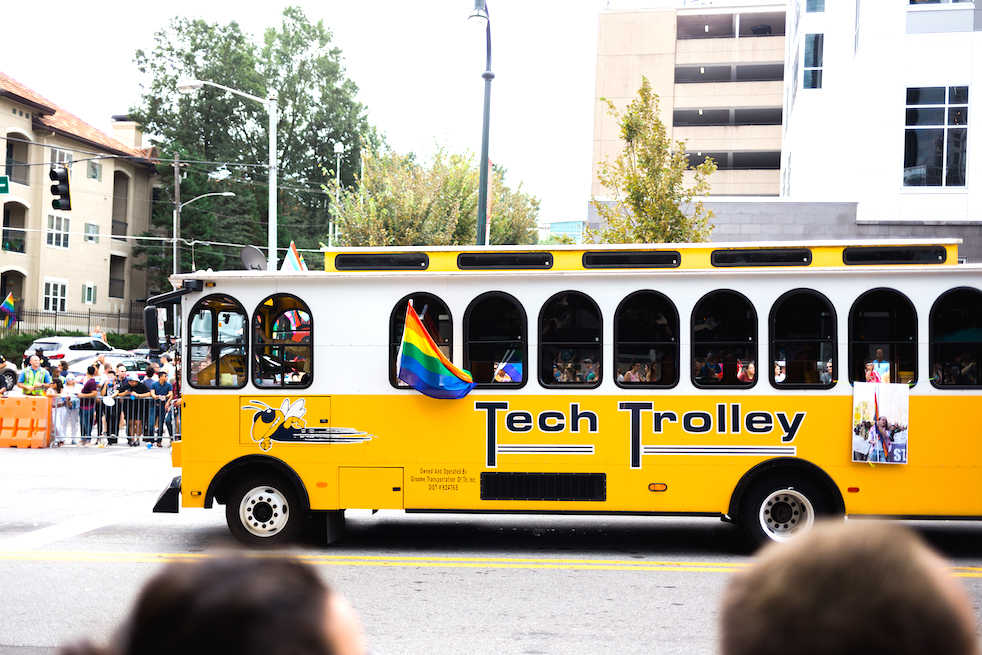In keeping with the Atlanta Pride festivities earlier this month, Tech students and community members came together for OUT Week, Tech’s own campus Pride celebration. OUT Week aims to provide a platform for the Tech community to honor LGBTQIA progress.
“OUT Week is Tech’s annual celebration of the LGBTQIA community,” said Aby Parsons, inaugural director of Tech’s LGBTQIA Resource Center. “Since its inception, OUT Week has featured debates, socials, workshops and dances, all for LGBTQIA students and allies.”
One of the events this year was “Fruits of Our Labor: Racial Justice and Queer Liberation in the Deep South,” a reception and discussion for students and community members.
The event took place at DramaTech on Oct. 17 and was hosted by the LGBTQIA Resource Center in partnership with the African American Student Union (AASU).
OUT Week has held an annual reception for the past five years. However, the added discussion panel was shaped by student initiative.
“In 2016, Scout Schultz, who was then president of Pride Alliance, and Jake Orvis, who was then president of GT College Democrats, approached me about putting together a panel discussion during OUT Week that focused on the status of queer justice in the post-marriage equality era,” Parsons said. “I thought it was a fantastic idea and decided to combine this with the annual reception to give that celebration more meaning and impact.”
This month’s event served as a reflection of Schultz and Orvis’s idea.
The discussion panel consisted of four lifelong activists for social justice from the South.
“Between them, our speakers have worked to eliminate racism, homophobia and transphobia through civil disobedience, protest, legal advocacy, faith-based activism and education,”
Parsons said.
The speakers emphasized the positive impact of collaboration in a world where many people are affected by multiple forms of oppression.
Parsons also shared that the event itself was an example of such collaboration.
“In spring 2016, two black queer women approached me to express their frustrations at how their needs weren’t being met by either predominantly white queer groups on campus or predominantly straight and cisgender black student organizations,” Parsons said. “We had a long and productive conversation about how we could move the needle to ensure that the experiences of black LGBTQIA students were being addressed on campus.”
This conversation resulted in the inception of the Black Queer Lives Matter partnership between AASU and the LGBTQIA Resource Center.
“We’ve hosted one collaborative event per semester since then, including a Black Leadership Conference panel, a Black History Month exhibit and lecture, a student panel and now this OUT Week event,” Parsons said.
The speakers at the event hailed from a variety of backgrounds and contributed meaningful perspectives to the conversation.
“Lorraine Fontana began her activism in the Civil Rights movement organizing against the Ku Klux Klan in the 1960s and is still more active today than just about anyone I know,” Parsons said. “Reverend Duncan Teague insisted that black communities address the rising rates of HIV infection among black gay men when no one else wanted to talk about it; E.R. Anderson has been at the forefront of bringing racial and queer justice programming to Charis Books and More for the past several years and transforming the store into a community hub for critical conversations about social justice; Dean Steed is a formidable activist with the Solutions Not Punishment Collaborative, an organization dedicated to eliminating police brutality against queer and trans people of color in Atlanta.”
The discussion allowed each of the speakers to share their views on combating racism, homophobia and transphobia. It also highlighted the ways in which activism evolves over time, emphasizing the paramount importance of inter-generational conversation.
“We activists need to be learning from our community elders,” Parsons said. “All too often I see younger activists dismiss the work of our elders as being outdated or not intersectional enough; what we learned from speakers such as Lorraine and Reverend Teague is that we have much to learn from folks who have been doing this work for decades.”
“Fruits of Our Labor” was just one of a number of opportunities for the Tech community to become involved with Pride on campus. Those who would like to stay involved with the LGBTQIA Resource Center can do so through the various educational trainings and workshops offered year-round.
“Programs such as Safe Space, Trans 101 and our LGBTQIA Interfaith Lunch and Learn partnership with the Wesley Foundation are a great way for students and employees to learn more about the LGBTQIA community,” Parsons said. “We also offer programs specifically for LGBTQIA students, such as our Q Chats discussion groups and our new Queer Coffeehouse series. We also provide individual referrals and advising (but not counseling) to LGBTQIA students, including those who are questioning their identities.”
For more information about the LGBTQIA Resource Center, go to lgbtqia.gatech.edu. For more information about AASU, visit gtaasu.org.
